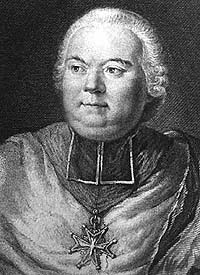François-Joachim de Pierre de Bernis

Bernis' signature:
François-Joachim de Pierre, Cardinal de Bernis (born May 22, 1715 in Saint-Marcel-d'Ardèche , today Département Ardèche , † November 3, 1794 in Rome ) was a French politician , poet and cardinal .
Life
Bernis came from a noble but poor family, attended the Lycée Louis-le-Grand , and went to the St. Sulpice seminary in Paris for a few years . At a very young age he became canon of the chapter in Brioude , later of Lyons (" Comte de Lyon "), and soon made himself the darling of good society at the French court through his gallant poems and witty conversation. Bernis won the favor of Madame de Pompadour , which brought him a royal pension and admission to the Académie française . In the cenacle of the Duchess du Maine he met Louise Charlotte Clotilde de Boutechoux-Palamballe , whom he had known since 1741 and with whom he developed the foreign policy of France for thirty years.
In 1751 he was appointed ambassador to Venice , but returned to Paris in 1755. After he had brought about the alliance with Austria against Frederick II of Prussia in 1756 , who had also insulted him with derisive remarks, he became Foreign Minister in 1757. He only held this office until 1758, because, because of the unfortunate course of the war in the Seven Years' War, he increasingly advised peace with Prussia even without Austria.
Shortly before his adoption, Pope Clement XIII. Bernis received the cardinal dignity on October 2, 1758 and sent him the cardinal's board . Bernis could not travel to Rome, however, as he was sent to his Abbey of Saint-Médard in Soissons by a cabinet order . He was ordained a priest on September 6, 1760. After living in Saint-Médard for five years , Louis XV called him . 1764 and appointed him Archbishop of Albi . He received his episcopal consecration on August 5, 1764 in the Cathedral of Sens by the Archbishop of Sens , Cardinal Paul d'Albert de Luynes ; Co - consecrators were Joseph-Bruno de Bausset-Roquefort , Bishop of Béziers , and Jean-Baptiste Champio de Cicé , Bishop of Auxerre . In 1769, de Bernis was sent to Rome for the conclave and, through his influence, brought about the election of Clement XIV. In 1769 he was appointed cardinal priest of San Silvestro in Capite .
Shortly afterwards he was appointed French ambassador in Rome. The respect that his court paid him was demonstrated by the unusual title of Protecteur des églises de France granted him in 1774 . After the French Revolution, he was relieved of his diplomatic post and lost his high salary and income from benefices (400,000 livres ), but remained in Rome, where he was financially supported by his friend, the Spanish diplomat José Nicolás de Azara . On April 18, 1774 he was raised to Cardinal Bishop of Albano .
François-Joachim de Pierre de Bernis died on November 3, 1794 in Rome and was initially buried in the church of San Luigi dei Francesi . In 1803, with the permission of the First Consul Napoléon Bonaparte , his remains were transferred to the Notre-Dame-et-Saint-Castor cathedral in Nîmes and buried there, but his heart and entrails ( præcordia ) remained in the Church of San Luigi dei Francesi buried in Rome .
Works
As a poet, he particularly cultivated “descriptive poetry” and had great success with Les quatre saisons, ou les Géorgiques francaise and Le palais des heures, ou les quatre points du jour . Editions of his oeuvres complétes appeared in Paris in 1797 and 1825; Drujon published his Poésies (Paris, 1882).
Since he devoted himself exclusively to the clergy, he renounced the practice of poetry and avoided even mentioning his poetic works. After his death, a poem was found among his papers: La religion vengée (new edition 1848). His correspondence with Voltaire appeared in Paris in 1799; Masson edited his memoirs and political correspondence Mémoires et lettres du cardinal de B. 1715–58 , Paris 1878, (2 volumes) and then: Le cardinal de B. depuis son ministére, 1758–74 (Paris, 1884).
literature
- François-Joachim De Pierre Bernis, Jean-Marie Rouart, Philippe Bonnet: Mémoires du Cardinal de Bernis. ISBN 2-7152-2192-4 .
- Bernis, François Joachim de Pierres . In: Meyers Konversations-Lexikon . 4th edition. Volume 2, Verlag des Bibliographisches Institut, Leipzig / Vienna 1885–1892, p. 782.
Web links
- Pierre de Bernis, François-Joachim de. In: Salvador Miranda : The Cardinals of the Holy Roman Church. ( Florida International University website), accessed November 17, 2016.
- Entry on François-Joachim de Pierre de Bernis on catholic-hierarchy.org ; Retrieved November 17, 2016.
- Short biography and list of works of the Académie française (French)
- Works by and about François-Joachim de Pierre de Bernis in the German Digital Library
| predecessor | Office | successor |
|---|---|---|
| Fabrizio Serbelloni |
Cardinal Bishop of Albano 1774–1794 |
Luigi Valenti Gonzaga |
| Léopold-Charles de Choiseul-Stainville |
Archbishop of Albi 1764–1794 |
Jean-Joachim Gausserand |
| Antoine Louis Rouillé |
Foreign Minister of France June 28, 1757 - October 9, 1758 |
Étienne-François de Choiseul |
| personal data | |
|---|---|
| SURNAME | Pierre de Bernis, François-Joachim de |
| ALTERNATIVE NAMES | Pierre de Bernis, François-Joachim Cardinal de; Bernis, François Joachim de Pierres |
| BRIEF DESCRIPTION | French cardinal, foreign minister and poet |
| DATE OF BIRTH | May 22, 1715 |
| PLACE OF BIRTH | Saint-Marcel-d'Ardèche |
| DATE OF DEATH | November 3, 1794 |
| Place of death | Rome |

